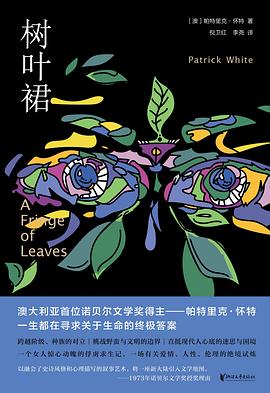WULOLIFE
《树叶裙》作者: [澳] 帕特里克·怀特出版社: 浙江文艺出版社
《树叶裙》作者: [澳] 帕特里克·怀特出版社: 浙江文艺出版社
Couldn't load pickup availability
Description
内容简介· · · · · ·
▲一个女人惊心动魄的俘虏求生记,一场有关爱情、人性、伦理的绝境试炼
▲挑战野蛮与文明的边界,直抵现代人心底的迷思与困境
▲澳大利亚首位诺贝尔文学奖得主——帕特里克·怀特代表作
————————————
内容简介:
《树叶裙》是1973年诺贝尔文学奖获得者、澳大利亚作家帕特里克·怀特的一部以女性为视角所展开的独立与冒险小说。
时间是19世纪40年代初期,年轻的英国贵妇艾伦随丈夫奥斯汀前往亚的范迪门地拜访丈夫的弟弟加奈特。身强力壮、野性奔放的加奈特另艾伦心神荡漾。责任与愧疚驱使她逃离了这场不期而至的欢愉,她下决心同丈夫登上返还英格兰的航船“布里斯托尔少女号”。
一场突如其来的海难将众人放逐至澳大利亚的荒岛。在那里,他们遭遇当地的她历经攀树捕鼠、与狗争食抗拒她曾效忠的一切——过世的丈夫、有罪的搭救者以及接纳她的阶级。然而,在回归文明世界的曙光到来时,她不知自己是否做好了准备……
————————————
媒体热评:
“阅读帕特里克·怀特……就是去触碰那权力的根源,去"
——《每日电讯报》
“一次圆满的成功……这是他极好的小说之一。”
——《泰晤士报》
“Chinese: "
——《星期日泰晤士报》
“《树叶裙》不只是一部简单的流放地故事。作者在编织故事时,考虑到了多种不同类型的关系。”
——《纽约时报》
名人推荐:
小说主人公的离奇经历正是澳大利亚自身的奇特劅,它以强烈的戏剧性的情节,呈现出澳大利亚的多彩、神奇和五光十色。现代主义和现实主义手法的交织、语言上的精益求精的锤炼,都使这部小说成为上乘之作。
——邱华栋(著名作家)
在画面宽广的叙述中,帕特采用了高度浓缩的语言,锻词炼句,哪怕是细枝末节也不例外,同时,以极度的艺术夸张和微妙的心理描写,始终如一地追求最强烈的艺术表现力,使真和美紧密相连,融为一体:美,是放射光华和生命、激发天地万物和各种现象的诗意的美;真,纵然一瞥之下可能令人厌恶和惊恐,却是它自身的揭示和解放。
——朱炯强(著名翻译家)
我看中了小说,或许更像是我把它作为将我这样一个由相互矛盾的性格组成的角色介绍给不肯轻易相信的观众的手段。
——帕特里克·怀特《镜中瑕疵》
作者简介· · · · · ·
帕特里克·怀特(1912—1990)
Patrick White
2020 2020理描写的叙事艺术,将一座新大陆引入文学地图”,而于1973年被授予诺贝尔文学奖。
怀特出生于英国伦敦,不满一岁时随父母回到澳大利亚悉尼。怀特在澳大利亚的农场度过了童年时光,1932年进入剑桥大学国王学院攻读法国与德国文学,读书期间出版了他的首部诗集《农夫与其他诗》。
怀特一生创作颇丰,出版有《人树》(1955)、《探险家沃斯》(1957)、《乘战车的人们》(196 1)、《风暴眼》(1973)、《树叶裙》(1976 )等长篇小说12部,中短篇小说集3部,此外还有剧作8 page触细腻、极富诗意,擅长在意识流及叙事之间自由切换,有着极高的艺术水准。怀特一生拒绝了无数文学奖项,也很少世于悉尼的公寓。
译者简介
倪卫红,北京外国语大学英语语言文学博士,曾任国家审计署国际合作司国际组织处处长,从事国际交流与合作以及国际项目管理工作多年,精通同声翻译、交替翻译与李尧合译)、《澳大利亚历史 (1788-1942)
李尧(1946— ) ,北京外国语大学客座教授。翻译出版英美、澳大利亚文学、历史专著53部。其中长篇小说《浪子》《红线》《卡彭塔里亚湾》获澳大利亚澳中理事会翻译奖。2008年获澳2018 大利亚政府颁发的“杰出贡献奖章”。2018
